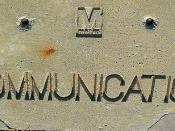(i) Communication is the activity whereby an individual or group conveys,consciously or unconsciously, information, feelings or ideas to another individual or group, and where necessary evokes a discriminating response.
Barriers can arise at any stage of the communication process or include 'noise' in the general environment.
The barrier may arise out of skill deficiencies in the transmitter and/or the receiver since communication cannot be effective without a common reference and meaning for the words and symbols used.
Recommendation: training in language and communication skills with emphasis on accuracy, brevity and clarity. The recipient has to be clear on what is said, follow the structure and respond positively to the tone.
Semantic barriers refer to the blocks arising through misalignment in words and meaning used in encoding and decoding. Imprecise use of language leads to misunderstandings especially where body language is also used. Similarly specialist jargon may exclude recipients from outside the group.
Recommendation: language must be related to the audience for it to make sense. Specialist jargon is reserved for peer groups. Misunderstanding can be reduced by duplicating oral communication with written confirmation.
Other barriers arise out of an individual's ability to distort meanings or mis-interpret intentions based on personal perceptions of those they communicate with.
Barriers will be created where:
- The transmitter or recipient is either distracted or not interested in communicating.
- Recommendation: good communication is based on established
relationships so efforts to build trust and mutual respect pave the way for removal of this barrier.
- The relationship between the two interferes with interpretation due to status differentials (e.g. inhibiting feedback),professional conflicts (limits trust/openness).
- Initial opinions tend to be formed around stereotypes rather than understanding of the individual themselves. Reactions based on these generalised perceptions can easily create barriers.
- The halo effect is a...



Good Work
I think the essay is well structured n the points clear n well laid out.Good Work.
0 out of 0 people found this comment useful.